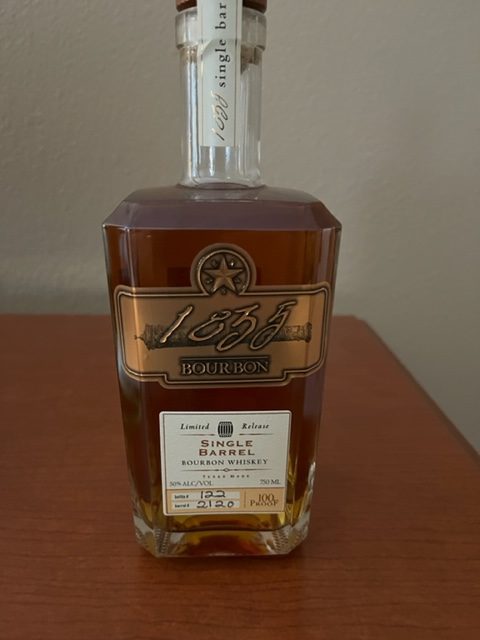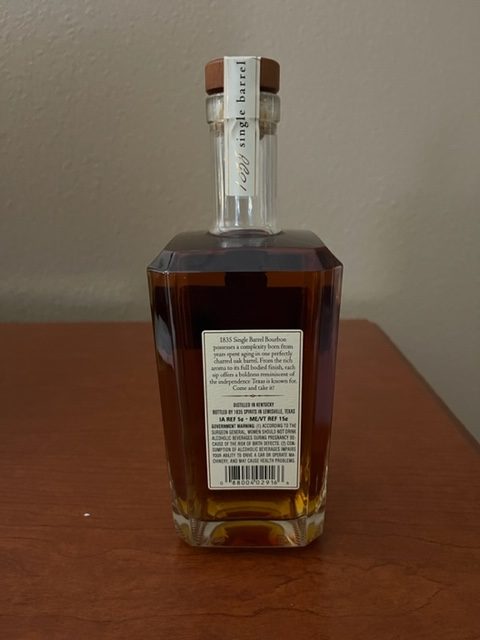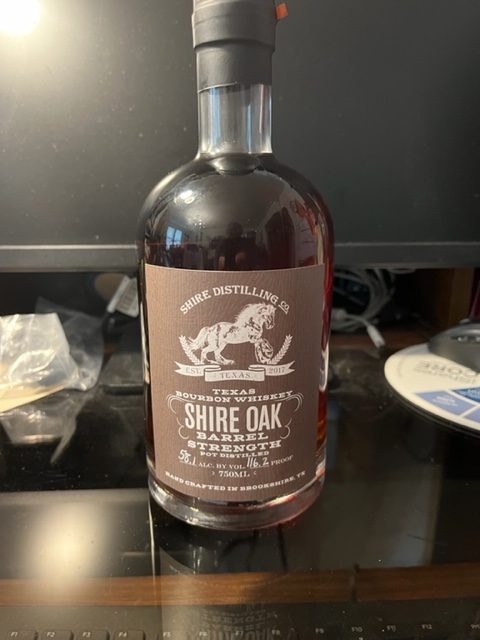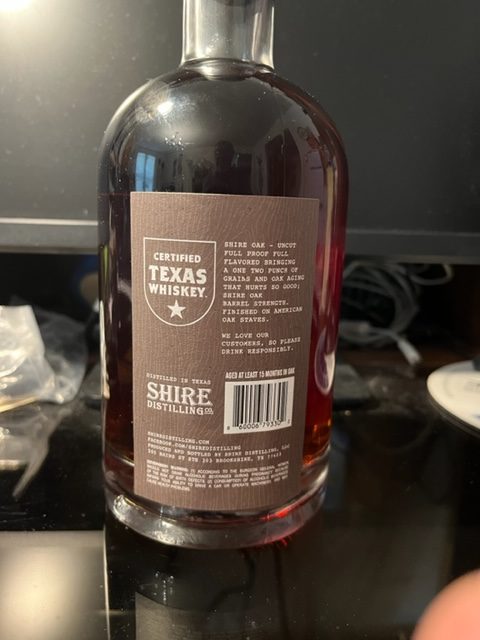This is a story about Texas. It doesn’t have anything to do with the recent NRA Annual Meeting, Uvalde, or gun control. Rather it is about a product coming from Texas for which they are building a good reputation. That product is whiskey.
In my past trips to the Houston area, I have come home with whiskey produced by Balcones (Waco) and Rio Brazos (College Station). The former is actually distilled in Texas while the latter is a blend of Texas and non-Texas bourbons. Both were purchased at Spec’s which is a Houston-area chain of liquor stores. If I remember correctly, Spec’s was recommended to me as the go-to place by Mark Gillespie of the WhiskyCast Podcast.
Thus, on this trip to Houston for the NRA Annual Meeting I was determined to come home with some more great Texas bourbon. I bought two bottles of bourbon from two different Spec’s locations
The first bottle was purchased at Spec’s near the Alameda Mall in South Houston. I was approached by a young clerk who offered to help as I was studying the selection. I explained that I was looking for Texas whiskey. He highly recommended the Lone Star 1835 Limited Release Single Barrel bourbon. I deferred to his advice and bought it. In retrospect, I should have examined the bottle just a little closer.

Looking at the front of the bottle it has the Lone Star, a cannon, and 1835 which is when the citizens of Gonzales told the Mexican Army who wanted their cannon to come and take it. Doesn’t that just scream Texas to you!

The back of the bottle continues the Texas imagery. It says, “each sip offers a boldness reminiscent of the independence Texas is known for. Come and take it.” Then the three little words which follow dash that image all to pieces: Distilled in Kentucky. WTF?! It seems Spec’s has a history of hawking this bourbon heavily.
I was pissed when I saw that. I was pissed at the cluelessness of the young clerk and I was pissed at myself for not reading the label. I know what sourced bourbon is and oft time it is good. That said, this is not Texas bourbon distilled from Texas corn and aged in the heat of Texas. I’m sipping a sample of it now and it is OK. The finish is not that great. I find it a bit metallic.
As well-known bourbon writer Chuck Cowdery wrote about their bourbon:
But that’s not what Texans care about, I reckon. They don’t much care what some government regulators in Washington think either. They care about Texas grains, Texas yeast, and Texas water. They care about Texas-distilled whiskey maturing in the Texas heat. They care about Texas jobs. And they don’t buy whiskey that says “Made in Texas’ when it’s not.
Just like they don’t buy salsa made in New York City.
Since I had decided attending the NRA Board meeting would have been a waste, I had some time before I had to return my rental car. I decided to give Spec’s another chance. This time I drove into downtown Houston to their flagship store on Smith Street.

This time I was very specific with the clerk that the whiskey had to be distilled in Texas. We discussed Balcones, Still Austin, and Shire Oak among others.


Shire Distilling is out of Brookshire, Texas which is west of Houston. As you can see on the back of the bottle, it is “certified Texas whiskey“. This certification comes from the Texas Whiskey Association and means that everything from “grain to glass” was done in Texas. In other words, the grain was grown in Texas, the fermentation of the mash was in Texas, the distilling was done in Texas, the aging was done in Texas, and the bottling was done in Texas.
The difference between the two bourbons is like night and day. The Shire Oak is barrel strength and has a lot of flavor. It might not be as old as the Lone Star 1835 but the aging in the heat of Texas really pulls something out of the charred oak. The real kicker is that they were priced within a few bucks of one another.
My point in this post is that you have to study the label and look for the clues. If the whiskey is distilled in a state other than that of the producer or bottler, it must be disclosed. The Treasury’s Tax and Trade Bureau approves all labels for alcoholic beverages and has specific requirements. I’m OK with sourced whiskey as many are excellent. My point is that is not cool to confuse the origin of a whiskey with a lot of verbiage and that is especially true of Texas whiskey.


Bourbon made in Kentucky? What a travesty! Lol
I find that many products make it difficult to determine the origin.
I have over 100 bottles of bourbon, toured dozens of distilleries large and small and done a few organized tastings that were not part of a distillery tour. I moved to TX from the east coast in 2020 and 3 things struck me.
1) TX reputation for being “pro-gun” is largely undeserved, or at least overblown. Lots of silly restrictions on the books here.
2) No state income tax, but the real estate tax is lacking in rationality and sanity.
3) Texas distilleries are entirely too impressed with themselves.
Now, I realize that a lot of them are young relatively speaking but many have been rushed to market to say ‘try our bourbon’. The problem is that they’ve staked their name and reputation on a junior varsity player who is destined to lose; you’re putting out a 2 year aged bourbon up against a market of 30 dollar per bottle or less KY or VA bourbons that are 8-10 year aged bourbon? Most of the Texas bourbons I’ve sampled … about 15 now – have been heavily skewed toward an unrefined, corn syrup like taste indicative of an imbalance due to a lack of maturity. I once heard Brian Prewitt, Master Distiller at A. Smith Bowman in VA tell someone that bringing to market a spirit too early is not only bad business but it’s a reputation killer.
It’s entirely possible to get a great bourbon to market in under 5 year. Look at Old Forester: 1897 Bonded, 1910, Statesman among others are excellent, well balanced expressions all aged about 4 years.
Ironroot: I can’t believe they released some of the stuff I have tasted from them. Again, like corn syrup almost, with that certainly being the dominant profile.
Garrison Brothers: To me, this is one of the, if not the biggest ‘overpriced’ spirit in Texas. It’s nowhere near as good as say… Buffalo Trace and it’s literally 2x as expensive at every level. The Single barrel is 90-110 / bottle, not fully matured and again not as good as a 45 dollar bottle of Old Forester.
TX bourbon: Actually these guys have some good expressions- port finished is not too shabby, but you can get A Smith Bowman; Isaac Bowman for less and it’s better (of course). But TX is trying to put out good spirits and at least being a bit more realistic about it.
Yellow Rose(Houston): Their signature spirit is 100% corn mash bill. The only other 100% corn Bourbon I’ve had was ironclad – a master class in how not to distill. So it was with trepidation I waded into the Yellow Rose tasting.
Almost reluctantly, I have to admit their 100% corn bourbon isn’t bad and better than the 3 Garrison Brothers I’ve tasted for half the cost. YR has Harris County Bourbon with a traditional bourbon mash bill but still a little immature. Despite this, it’s pretty good. I hope they mature this line and keep up their efforts all around. I think these guys have promise and stand a chance of being a competitor in the bourbon market.
Some of these other distilleries seem to be catering to the ‘buy it because it’s from Texas, not because it’s good’ crowd and there are quite a few of those consumers here.
Texas master distillers need to spend some time on the Kentucky bourbon trail to see what real bourbon is supposed to taste like.
I have to agree with you about most “craft” bourbons when compared to the big guys such as Buffalo Trace, Heaven Hill, etc. I’ve had some young stuff from NC that was expensive yet not worthy of mixing with Coca-Cola. It is a drain on a company’s cash flow to just let it age but that is what you really need to do if you want good whiskey.
One of my favorites that is a good all-around bourbon is Old Heaven Hill Green Label. It is a 6 y.o. 90 proof bourbon that I picked up in KY for about $12 a bottle. You can only find it in KY and Indiana from what I understand.
During one of the privatization pushes here in PA, a leader of the state agency that is responsible for all wine & liquor sales said that the state management means there’s absolutely professionalism and incredible specialty knowledge that wouldn’t be available in most privately-owned wine & liquor stores. So an activist went to a local shop and asked for a specific variety of wine – not brand, nothing obscure – just a simple varietal. It wasn’t as common as, say, merlot, but it wasn’t something your average wine drinker wouldn’t have heard of. The clerk insisted no such wines existed like that. Now one benefit to the state system is that they have long had an online system where you can look up the inventory of what is at a particular location. Of course this activist knew they had it in stock and even had a few different brands.
Your case reminded me of that story from several years ago. We still don’t have privatized wine/liquor sales, but they at least expanded the options to buy outside of state-managed stores if you pay enough in bribes (or, as they call them, fees).
One advantage – perhaps the only advantage – our NC’s state run liquor stores is that I can check the price online. It will be same statewide unless a local system is clearing out a few bottles at a reduced price. I have used that when shopping in other states to see if their prices are that good as well as to see if I could find it at home.
You know what else is Texan, and from Kentucky?
Dan’l Boone….
Stephen Austin? Virginia
William Barret Travis? South Carolina
It doesn’t matter where you are from, in Texas — Just that you got there as soon as you could.
BTW, Balcones Single Malt Whisky… None of that Tennis Shoes stuff.
I think both Pennsylvania and North Carolina can claim Dan’l. His parents Squire and Sarah Boone are buried in Davie County, NC which is my in-laws were from.
I’m surprised you didn’t mention Crockett as he was from Tennessee originally.
Bitter:
“one benefit to the state system is that they have long had an online system where you can look up the inventory of what is at a particular location.”
This isn’t really a benefit of the state system, it is what companies do if they care. Lowe’s and HD and numerous other stores do the same thing, none run by the state. Props to the person who decided that it was worth investing the time and money into their monopoly to serve the customer better but…